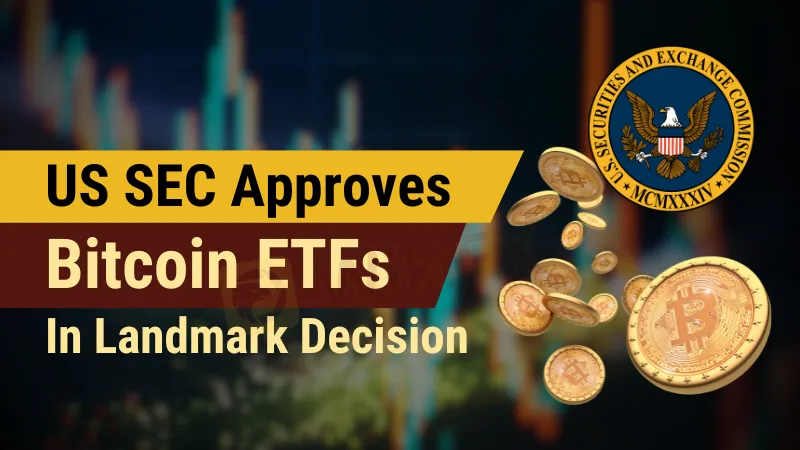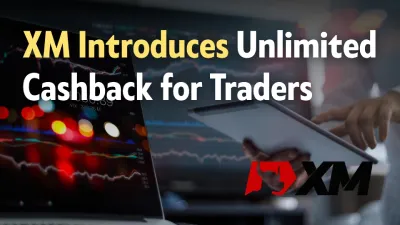简体中文
繁體中文
English
Pусский
日本語
ภาษาไทย
Tiếng Việt
Bahasa Indonesia
Español
हिन्दी
Filippiiniläinen
Français
Deutsch
Português
Türkçe
한국어
العربية
US SEC Approves Bitcoin ETFs in Landmark Decision
Abstract:US SEC Approves Bitcoin ETFs - A Historic Milestone for Cryptocurrency. Institutionalizing Bitcoin as an Asset Class.

In a historic milestone for the cryptocurrency industry, the U.S. Securities and Exchange Commission (SEC) has approved the first-ever U.S.-listed exchange-traded funds (ETFs) to track Bitcoin. The decision, which was announced on Wednesday, marks a significant step forward for the world's largest cryptocurrency and the broader crypto market.
The SEC has given its approval to a total of 11 applications, including those from prominent firms like BlackRock, Ark Investments/21Shares, Fidelity, Invesco, and VanEck. Despite some concerns raised by officials and investor advocates regarding the potential risks associated with these products, most of them are set to commence trading as early as Thursday, sparking intense competition for market share.
These Bitcoin ETFs have been in the making for over a decade, and they represent a transformative development for Bitcoin. They offer investors the opportunity to gain exposure to the world's leading cryptocurrency without needing to directly hold it. This approval is viewed as a significant step towards institutionalizing Bitcoin as an asset class, and it brings a sense of legitimacy to the crypto industry, which has faced its share of challenges and controversies.
Andrew Bond, managing director and senior fintech analyst at Rosenblatt Securities, commented on this historic move, stating, “It's a huge positive for the institutionalization of Bitcoin as an asset class.”
Standard Chartered analysts have predicted that these ETFs could attract between $50 billion to $100 billion in investment within this year alone. While others have projected inflows of approximately $55 billion over the next five years. As of Wednesday, the market capitalization of Bitcoin stood at over $913 billion, according to CoinGecko, and the total net assets of U.S. ETFs were approximately $6.5 trillion as of December 2022, according to the Investment Company Institute.
In anticipation of these developments, Bitcoin's price has surged by more than 70% in recent months, reaching its highest level since March 2022 earlier this week.
The success of these ETFs in attracting investments is expected to hinge largely on factors such as fees and liquidity. Some issuers have already reduced their proposed fees, with rates ranging from 0.2% to 1.5%, and some firms are even waiving fees for a certain period. Liquidity will be particularly crucial for short-term speculators interested in trading these products.
Expect a surge in online advertising and marketing campaigns from companies launching these ETFs. Bitwise and VanEck, for example, have already begun promoting Bitcoin as an investment.
The SEC's approval comes on the heels of an incident where an unauthorized individual posted a fake announcement on the SEC's social media account X claiming that the agency had approved the products for trading. The agency promptly disavowed and removed the post, and it is now coordinating with law enforcement and its internal watchdog to investigate the incident.
Related news:
Despite these minor hiccups, the crypto industry is celebrating this momentous occasion. Grayscale CEO Michael Sonnenshein remarked, “We believed that Bitcoin could change the world, and we were and remain excited at the prospect of democratizing access to this asset.”

Douglas Jones, head of exchange-traded products at the New York Stock Exchange, where some of these products will be listed, emphasized that this approval is also a significant milestone for the ETF industry.
Cynthia Lo Bessette, head of digital asset management at Fidelity, expressed enthusiasm about the new products, stating, “They should provide increased choice for investors who want to engage with crypto.”
Experts in the regulatory field suggest that the approval of Bitcoin ETFs could open the door for other innovative crypto products. Several issuers have already filed applications for ETFs tracking other cryptocurrencies, including the second-largest, Ethereum.
Jim Angel, associate professor at Georgetown's McDonough School of Business, noted, “Once the dam has been breached, it‘s going to be hard for the SEC to continue its ’just say no to crypto approach.”

It's important to note that cryptocurrencies, including Bitcoin, were created as an alternative to government-backed fiat currencies like the U.S. dollar and the euro. However, due to their high volatility, they are often used as speculative investments.
The decision by the SEC represents a significant reversal in their stance on Bitcoin ETFs, as they had previously expressed concerns about potential manipulation. SEC Chair Gary Gensler, a well-known crypto skeptic, took the unusual step of voting in favor of the products alongside two Republican commissioners, while two Democratic commissioners voted against them, citing concerns about investor protection.
Gensler emphasized that the approval does not constitute an endorsement of Bitcoin, describing it as a “speculative, volatile asset” that is also used for illicit activities. He reiterated that Bitcoin is considered a commodity, not a security, and the SEC's decision does not signal a relaxation of its enforcement efforts against crypto entities it believes are violating its regulations.
To meet the SEC's requirements for investor protection, several exchanges initially proposed collaborating with Coinbase, the largest U.S. crypto exchange, to oversee trading in the underlying Bitcoin market.
However, these issuers later opted for an existing partnership with the Chicago Mercantile Exchange, a key player in Grayscale's recent legal victory. It's worth noting that the SEC is currently pursuing legal action against Coinbase for alleged violations of U.S. securities laws, a claim that the company has vehemently denied.
Dennis Kelleher, CEO of investor advocacy think tank Better Markets, expressed concerns about the approval of Bitcoin ETFs, warning that the cryptocurrency remains susceptible to fraudulent activities, and he referred to the ETFs as a “historic mistake.”
The approval of these Bitcoin ETFs represents a significant turning point for the cryptocurrency market, and it is expected to have far-reaching implications for the broader financial landscape.

Disclaimer:
The views in this article only represent the author's personal views, and do not constitute investment advice on this platform. This platform does not guarantee the accuracy, completeness and timeliness of the information in the article, and will not be liable for any loss caused by the use of or reliance on the information in the article.
Read more

Harsh Truths About ATC Brokers Every Trader Must Know
Many regulated brokers hide the risks associated with them. They never talk about these risks and try to attract customers with appealing offers. Later on, customers discover these hidden risks and feel disappointed. Before you come across a similar situation, we want to let you know the risks involved with ATC Broker. Check out the article to discover the harsh truth about it.

Major U.S. Banks Plan Stablecoin Launch Amid Crypto Regulations
Major U.S. banks like Bank of America and Citibank explore stablecoins as new crypto-friendly bills set to reshape digital assets' role in finance.

XM Launches Unlimited Cashback Promotion for Traders Worldwide
XM launches unlimited trading cashback from July 15 to August 15. Get unlimited rebates with a Standard or Micro account and enjoy expanded trader club benefits.

10 Signs of a Fake Forex Trading or Crypto Website
Been to a forex trading or crypto website promising guaranteed returns, displaying too good to be true testimonials and far too many impressive features? Beware, it's a SCAM! In this article, we discuss 10 signs of a fake forex trading or cryptocurrency website.
WikiFX Broker
Latest News
PrimeXBT Launches MT5 PRO Account for Active Traders
Renault shares plunge 16% after French carmaker lowers guidance, appoints new interim CEO
Darwinex Launches INDX: A Revolutionary Investment Strategy for Traders
Top Forex Trading Scams to Watch Out for in 2025
eToro Expands into Singapore with MAS CMS Licence
Real Risk Factors with Admiral Markets ! Explained
5 things to know before the stock market opens Wednesday
5 Reasons to Know Why INFINOX Is a Standout Broker?
Trump's big beautiful bill' caps student loans. Here's what it means for borrowers
Weekly mortgage demand plummets 10%, as rates and economic concerns rise
Currency Calculator



